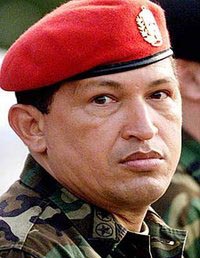Hugo Chavez intends to make the whole world stand firmly against USA
Venezuelan President Hugo Chavez likes to travel. His trips do not stand out for their variety, though. As soon as there is a country, which publicly declares its opposition to the USA, one can presume that this country will soon be visited by Venezuelan diplomats and maybe by President Chavez himself. His recent tour can only prove such a supposition. After visiting China, the charismatic leader went to Malaysia, then to Syria and Angola.

It goes without saying that China is the most important step in Chavez’s tour. The president spent the end of the past week in Beijing where he concluded several agreements that seem to be highly remunerative to Venezuela. It is particularly planned that the Latin American country, which comes fifth among world’s biggest oil exporters, will increase its oil shipments to China up to 200,000 barrels a day until the end of the current year.
Venezuela has much bigger plans for the future: 500,000 barrels by 2011 and a million barrels by 2012. It is worthy of note that specialists do not find such numbers impressive. As a rule, the Venezuelan oil is shipped to the Atlantic coast of the country. Oil tankers will not be able to carry such tremendous volumes of oil through Panama Canal. The vessels will most likely have to travel around the whole South American continent. Needless to say that it will be the longest and the most expensive oil-transporting route. To make matters worse, the oil mined in Venezuela requires extra costs for cleansing. It just so happens that the profitability of the project is solely based on the current high oil prices.
In addition to cooperation with China in the oil industry, Hugo Chavez concluded several agreements in the field of agriculture, gold and coal mining, tourism and the infrastructure development. Here it would be interesting to compare the foreign policies of modern China and the former USSR. It is an open secret that the Chinese administration sticks to the communist ideology and tries to annoy the USA as much as it can. Unlike Soviet leaders, the Chinese officials know how to count money. China realizes that Venezuela’s success needs to be substantiated; Chavez needs to do a lot to achieve a real economic breakthrough for the country.
At present moment Hugo Chavez’s tour is accompanied with scandalous statements and promises. The president of Venezuela tries to win a seat at the UN Security Council (elections are to take place in October). Chavez obviously tries to advertise his country and promote himself. Malaysia, Syria and Angola will be able to exert a certain influence in their regions if Chavez manages to convince local politicians of the need to stand firmly against the US administration.
Translated by Dmitry Sudakov
Pravda.Ru
Subscribe to Pravda.Ru Telegram channel, Facebook, RSS!





